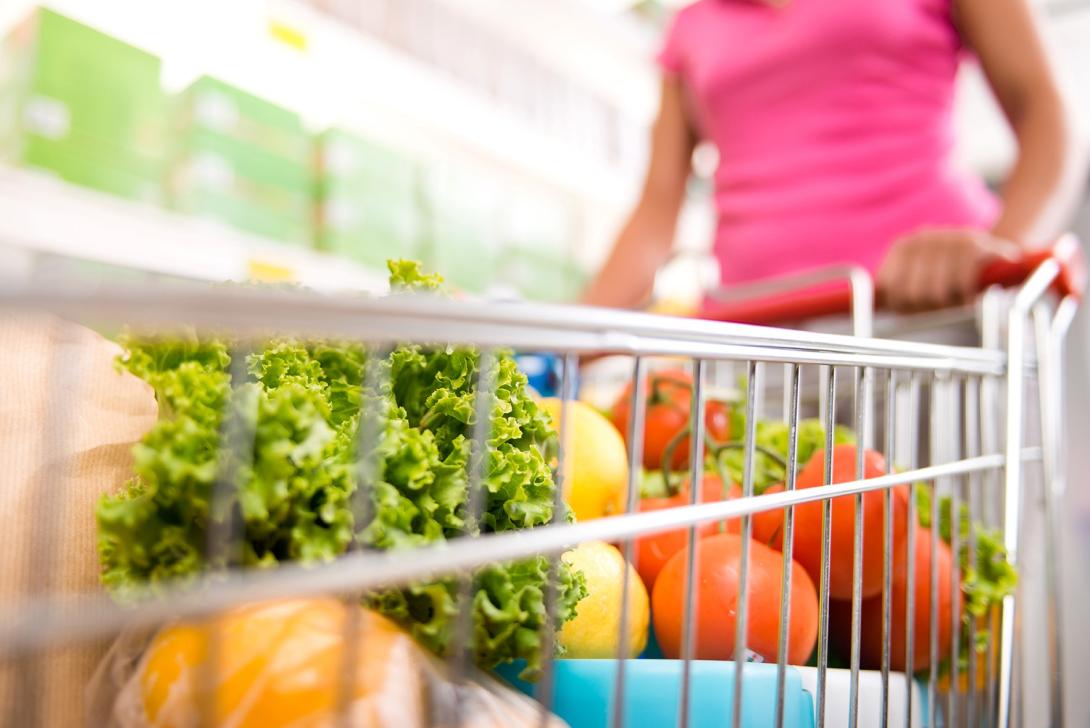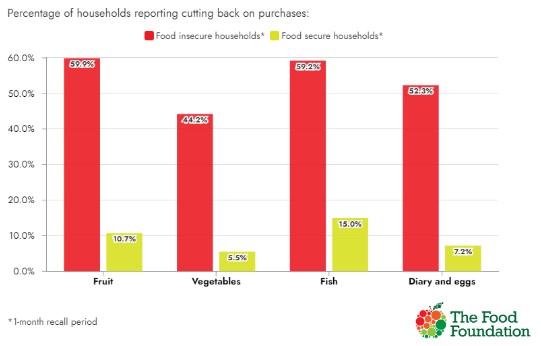27 February 2024
Families stuck in food insecurity are buying less fruit and veg as UK’s health divide widens

Families stuck in food insecurity are buying less fruit and veg as UK's health divide widens
New data from The Food Foundation shows that 60% of food insecure households say they’ve bought less fruit and 44% bought fewer vegetables than normal in January 2024.
This compares to 11% of food secure households buying less fruit and 6% buying fewer vegetables. The Food Foundation is calling on policy makers to commit to take action on food insecurity in the Spring Budget.
Previous Food Foundation research found that the nation as a whole is eating less fruit and veg, with the amount of vegetables being bought by UK households having fallen to its lowest level in 50 years, but this new data shows the situation is dramatically worse for the poorest families.
The stats also reveal a fall in the number of food insecure households who report buying fish (59% now buying less) and dairy and eggs (52% now buying less).

The Food Foundation found that in January 2024, 15% of UK households were living in food insecurity. This is equivalent to approximately eight million adults and three million children.
Among households with children, 20% are living in food insecurity. As a result of it being so difficult to eat healthily, poor diet is now the biggest risk factor for preventable disease, placing massive strain on the NHS.
The Food Foundation's Food Insecurity Tracker, regularly measures the rate of food insecurity in the UK and has been doing so since March 2020.
Though the overall rate of food insecurity has decreased slightly since June 2023, it still remains twice as high as in 2021. Stark health inequalities are highly prevalent, particularly when it comes to diet-related poor health.
The most deprived communities suffer disproportionately from much higher rates of disease, from obesity to type 2 diabetes to cardiovascular disease to dental decay.
Adding to this, recent reports show an increase in hospital admissions for nutrient deficiencies, this data should ring alarm bells. The longevity of the cost of living crisis now means food insecurity has become the norm for many households who are unable to buy staple nutritious products.
For households living on the breadline, nutrient rich items are often unaffordable as healthier options cost, on average, more than twice as much per calorie compared to less healthy options.
With fruit and veg consumption continuing to decrease amongst those most impacted by the cost of living crisis, food inequalities are getting worse and, in all likelihood, so will health inequalities.
Although food inflation has decreased, prices remain high and The Food Foundation's Basic Basket Tracker shows that the price of a reasonably-costed, adequately-nutritious weekly basket of food has increased by 24-26% since April 2022 (from £43.52 to £54.64 for a man and from £40.96 to £50.77 for a woman).
This means that some of the most vulnerable in society are still in a position where they can’t afford to eat properly. The Food Foundation data shows that in January 2024:
- 20% of households with children reported experiencing food insecurity
- 20% of households with children reported that children were directly experiencing food insecurity
- 45% of households in receipt of Universal Credit reported experiencing food insecurity
- 24% of households of non-white ethnicity are food insecure, they are 1.6 times more likely to be food insecure than white (15%)
- 38% of households with an adult limited a lot by disability experienced food insecurity, 3.6 times more than households with adults not limited by disability (11%)
- 35% of single adult households with children have experienced food insecurity
- 15% of those in some kind of employment were food insecure, showing that being in work doesn’t guarantee that you’ll have enough money to afford food
As we approach the Spring Budget, The Food Foundation is calling for the Government to ensure no one in the UK has to suffer food insecurity by ensuring that national living wage and benefit levels are set at values that take into account what is required for families to afford a healthy diet.
Other key policies to reduce financial pressure on families should include:
- Committing to the continuation of the Household Support Fund
- Expanding eligibility, improving uptake and increasing the value of the Healthy Start payment
- Increasing access to Free School Meals by extending the eligibility criteria to all children in families in receipt of Universal Credit, and auto-enrolling all eligible children, with the long term goal of providing Universal Free School Meals.
Anna Taylor Executive Director of The Food Foundation, said: "It is hugely concerning to see that families experiencing food insecurity are now reporting that they are buying less fruit and veg.
"Often products with the worst health credentials that are high in fat, salt and sugar, or ultra processed are the cheapest option for those who are struggling to afford food to feed themselves or their families.
"We’ve seen that for this group, fruit and veg is often the first thing to be sacrificed. Everyone should have the right to a healthy diet that will enable them to thrive and policymakers need to step up and acknowledge that this health divide simply isn’t good enough in one of the richest countries in the world."
Michael Marmot, Director of the UCL Institute of Health Equity and Professor of Epidemiology and Public Health said: "There are fewer needs more basic than nutritious food for you and your children. In the UK in 2024, one in five households with children cannot meet that basic need.
"They are simply too poor; and the poorer they are the less likely they are to be able to meet that need.
"The resultant ill-health will most likely make health inequalities worse. Too many people in work are lowly paid, and universal credit does not pay enough to meet basic needs. A healthy society must pay attention."
Royal College of Paediatrics and Child Health President, Dr Camilla Kingdon, said: "As a paediatrician I find this data deeply worrying.
"When I talk to parents, they already know what food will provide their children with the best nutrition – but so many consistently report how expensive it is to buy fruit and veg.
"Parents are often left with no option other than to buy cheaper highly processed food that is high in both salt and sugar.
"Child health outcomes are worsening across the board and I have no doubt that food scarcity and subsequent poor nutrition play a big role in this.
"Our children have the right to a happy and healthy childhood, and that means access to nutritious, sustainable foods."
NOTE TO EDITORS
Please contact: Juliet Grant on 07929075489 or email juliet.grant@foodfoundation.org.uk
AVAILABLE FOR INTERVIEW
Anna Taylor, Executive Director, The Food Foundation
SOCIAL MEDIA
Twitter: @Food_Foundation
Instagram: food.foundation
The Food Foundation Podcast
For more in-depth analysis and lived experience listen to our podcast
ABOUT THE FOOD FOUNDATION
The Food Foundation is a charity working to influence food policy and business practice, shaping a sustainable food system which makes healthy diets affordable and accessible for all. We work in partnership with researchers, campaigners, community bodies, industry, investors, government and citizens to galvanise the UK’s diverse agents of change, using surprising and inventive ideas to drive fundamental shifts in our food system. These efforts are based on the continual re-evaluation of opportunities for action, building and synthesising strong evidence, convening powerful coalitions, harnessing citizens’ voices and delivering impactful communications.
Registered Charity Number 1187611.
WITH THANKS TO OUR FUNDERS, INCLUDING THE NUFFIELD FOUNDATION
The Nuffield Foundation is an independent charitable trust with a mission to advance social well-being. It funds research that informs social policy, primarily in Education, Welfare, and Justice. The Nuffield Foundation is the founder and co-funder of the Nuffield Council on Bioethics, the Ada Lovelace Institute and the Nuffield Family Justice Observatory. The Foundation has funded this project, but the views expressed are those of the authors and not necessarily the Foundation.
ABOUT THE DATA
As part of The Food Foundation’s regular Food Insecurity Tracking progamme we commissioned YouGov to conduct a survey of 6,051 adults in the UK between 9th-16th January 2024. The survey was carried out online. The figures have been weighted and are representative of all UK adults 18+. The figures presented from the online survey have been analysed independently by The Food Foundation and the London School of Hygiene & Tropical Medicine.
The Food Foundation asked three questions to assess whether people are food insecure. If they answer yes to any of the three questions, they are classified as food insecure: In the past month, have you/anyone else in your household: 1. Had smaller meals than usual or skipped meals because you couldn’t afford or get access to food? 2. Ever been hungry but not eaten because you couldn’t afford or get access to food? 3 Not eaten for a whole day because you couldn’t afford or get access to food?


